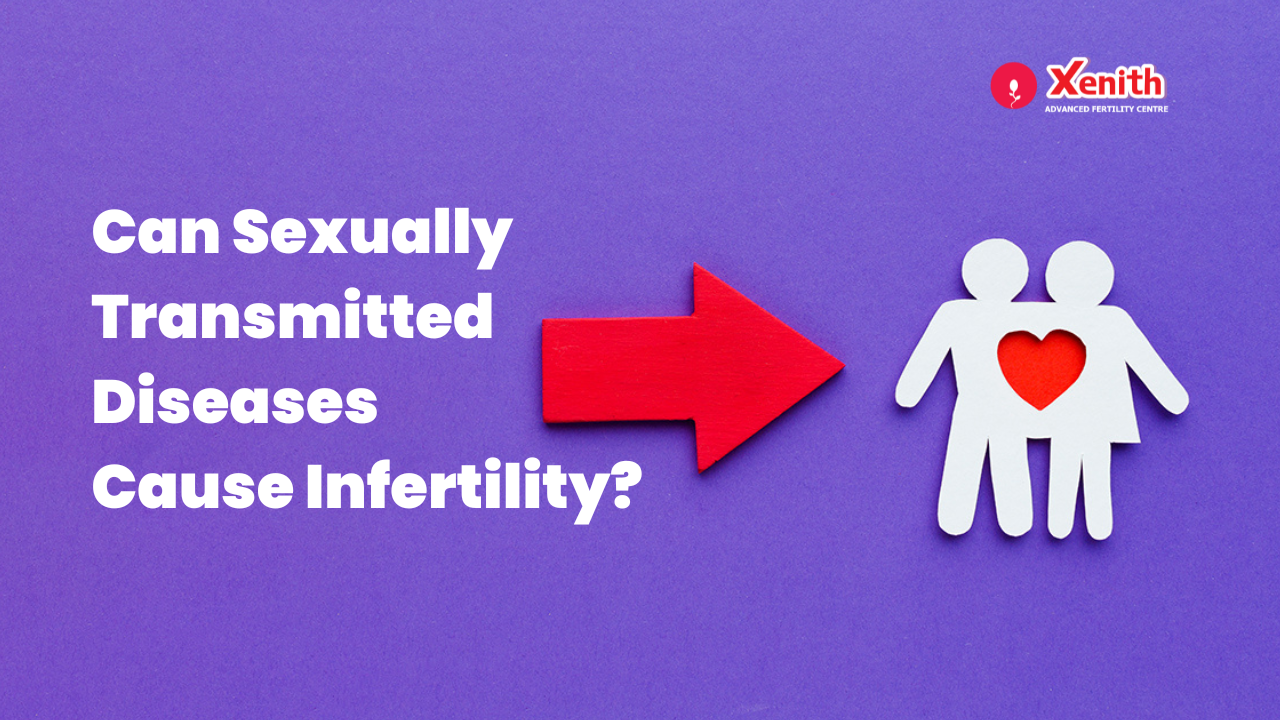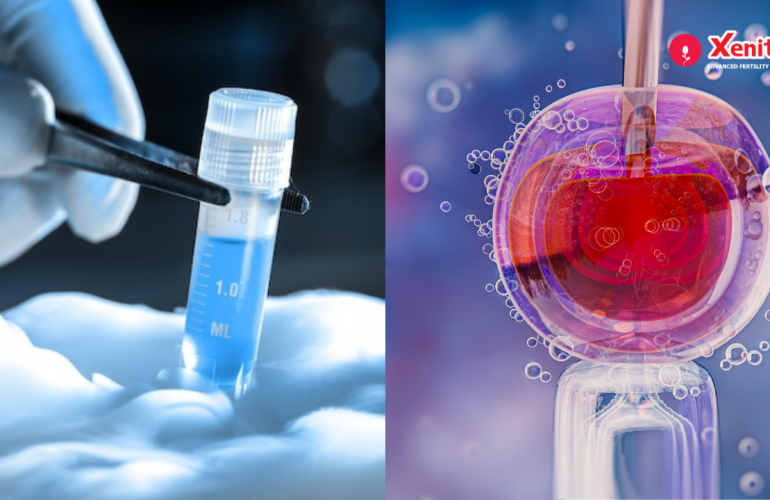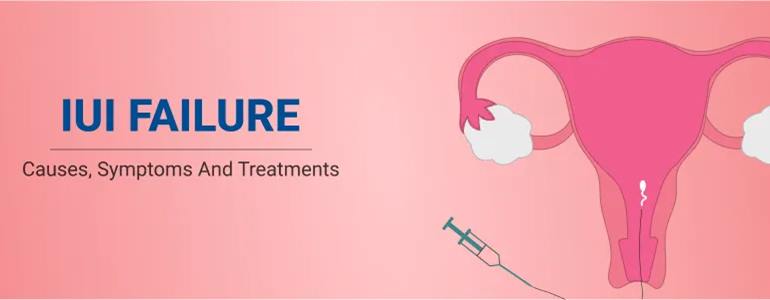Sexually transmitted diseases (STD) are infectious diseases that are transmitted from person to person, mainly through sexual contact through semen or vaginal fluids although they can also be transmitted through blood transfusions, breastfeeding, sharing needles and from a mother to her baby during pregnancy or childbirth. Sometimes STDs have no symptoms and may be unnoticed until the partner is diagnosed with it or symptoms or health issues begin to occur.
Infertility is the inability to conceive even after having regular unprotected sex for at least a year or more. STDs could lead to infertility in both men and women especially if it hasn’t been treated for a long while.

Free Thursday Consultation
Book Your AppointmentSome common types of STDs include Chlamydia, Gonorrhoea, Genital Herpes, Human Immunodeficiency virus (HIV), Syphilis and Hepatitis B.
How do STDs cause infertility in men?
In men, the urethra which is a tube which carries urine and semen out of the body and the epididymis which is a tube that stores and carries the sperm could get infected, inflamed, obstructed and/or damaged leading to issues with fertility. Other structures like the testicles and prostate could also become inflamed leading to infertility. HIV could reduce semen quality affecting successful conception. In men, STDs have different mechanisms to impair fertility such as damage to the sexual organs, damage to reproductive cells via inflammatory mediators, obstruction in the reproductive tract, and binding to sperms and rendering them useless. Being infected with HIV could decrease the quality and quantity of the sperm.
How do STDs cause infertility in women?
In women, a few STDs could cause pelvic inflammatory disease (PID) if not treated in time. PID could be caused by STDs like Gonorrhoea or Chlamydia. PID could produce scar tissue in the fallopian tubes that could cause blockage and prevent the fertilized egg from travelling to the uterus for implantation or else prevent the sperm from reaching the egg in the fallopian tube for fertilization. PID and other STDs could also scar or damage the vagina, cervix, ovaries, and uterus causing problems with conception. Another complication of PID could be ectopic pregnancy where the fertilized egg implants outside the uterus and this could be life threatening. When the fertilized egg implants in the fallopian tube, it is called a tubal pregnancy. It can also implant in other places like ovaries, or the abdominal cavity and even though there might be no symptoms at first, the growing embryo could cause pain, bleeding, and eventual bursting of the fallopian tubes if it is implanted there causing heavy bleeding.
Symptoms of STDs
PID could have no symptoms at all or some may have lower abdominal pain, pain during vaginal sex or when urinating, vaginal bleeding or discharge, have high temperature or other symptoms.
If left untreated, mothers could also pass syphilis to their unborn babies and could lead to miscarriage or stillbirth. In men, syphilis could lead to scarring and blockage of epididymis preventing sperm from being released during ejaculation. If untreated for a long time, syphilis could lead to erectile dysfunction due to progressive loss of nerve function.
Genital herpes is often characterized by small itchy, painful blisters that appear on the genitalia and could make urinating painful. One may also have flu-like symptoms. Herpes infection can stay dormant and later sometimes could be triggered due to illness, stress, fatigue or other conditions.
HIV could decrease immunity and increase the risk of infection. If it’s not treated with medication, it could cause acquired immunodeficiency syndrome (AIDS) with symptoms like sudden weight loss, lesions, extreme fatigue, certain neurologic disorders, and eventual death. There is also a higher risk of babies being born early, preeclampsia which is the mother having high blood pressure during pregnancy and stillbirth.
Treatment of STDs
Many STDs are treatable, although some don’t have a cure. Many of the STDs could be treated with antibiotics, other medications, or topical medication. HIV can be treated with medication to keep the virus at bay although it doesn’t have a cure. Men infected with HIV could have healthy kids through IVF where the sperm could be washed and fertilized with the egg. Women infected with HIV would need to take the prescribed medication to prevent transmission to their baby.
A pregnant woman with herpes could pass it on to her baby through vaginal delivery which in turn could be life threatening for the baby. So, she would have to undergo a caesarean section to deliver the baby. It helps to detect it early and get treated. If caught in time, it could prevent damage to the reproductive organs.
Chlamydia and Gonorrhoea can be treated with a full course of antibiotics and it is important to take the full dosage properly on time so that the infection is completely eradicated. It is also important to retest a few months after treatment just to make sure there is no infection. Also, during treatment, one should abstain from sex to avoid reinfection.
Syphilis though not commonly seen now, could be treated with antibiotics like penicillin and anti-inflammatory medicines. Abstain from sexual contact until the medications have been taken completely.
If the fallopian tubes have scarring or are blocked, there are surgical or non surgical methods to treat it depending on where it is located and the severity of the damage. Salpingostomy involves making a new opening near the ovary and tubal reconstruction involves removing some of the blockage or removing part of the blocked tube and then anastomosing the healthy parts together. Tubal cannulation is a nonsurgical (radiological guidance) or surgical (laparoscopic) option to treat blocked tubes. During this procedure a catheter is used to find the blockage and remove it from the fallopian tubes.
In some cases, damaged or blocked fallopian tubes cannot be treated, and in vitro fertilization (IVF) is the next recommended step.
Treatment for PID can often be oral antibiotics along with avoiding sexual contact until the medication is finished. Women with PID may require prolonged treatment with antibiotics. In some of the more severe cases of PID, surgery may be required .
.
Prevention
When condoms are properly used, it is highly effective in preventing STDs. Get tested regularly for STDs if you have multiple partners or a new partner. Talk to your sexual partner about undergoing testing for STDs before engaging in sex. You could get vaccinated against some STDs. Most people who have STDs are less likely to have issues with fertility if they get timely treatment. If you have any questions about STDs and how it will affect your fertility, feel free to talk to the experts at Xenith Advanced Fertility Centre.




